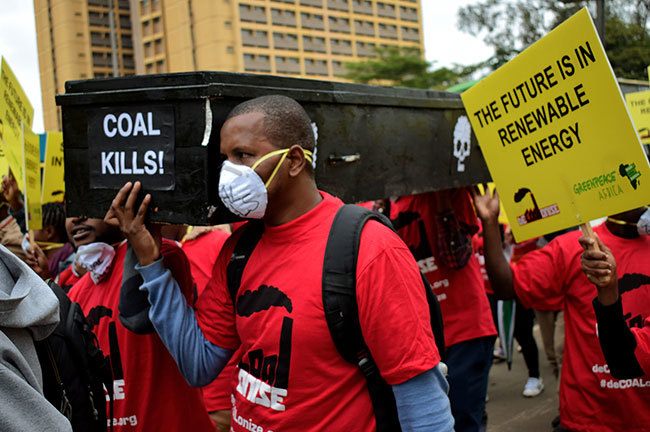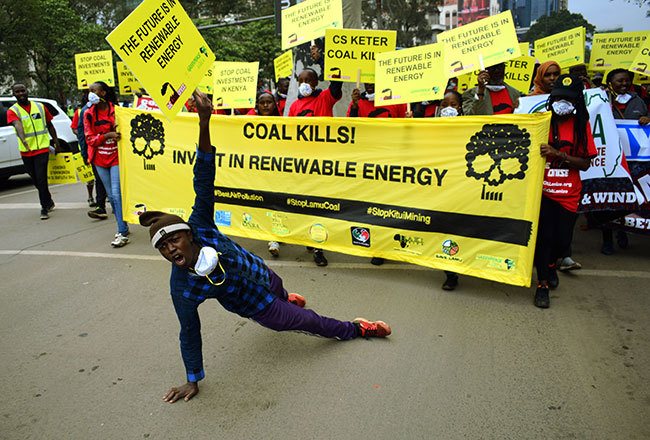“What makes me proud is that this win was a team effort. The world has seen now how communities can rise up and stand for what is right—to the very end,” says Omar Elmawi.
Omar is the Campaign Coordinator of deCOALonize, a coalition of organizations in Kenya turning the tide on rampant industrial development in their country. And he’s still beaming from the news of June 26, 2019. That’s the day Kenya’s National Environmental Tribunal revoked the license for development on a major coal plant in the coastal county of Lamu. Years of work spent assembling a case, investigating the plant’s immense harm and rallying public support, all building up to this victorious ruling.
“When you are resilient and consistent… success follows,” Omar says, simply and humbly. But the truth is: deCOALonize stopped a giant in its tracks.

DeCOALonize was formed in 2016 as a coalition of Kenyan human rights, environmental and energy justice organizations (including AJWS grantees Save Lamu, Natural Justice, Katiba Institute and KeNRA) to fight the harmful rise of coal mining and production in Kenya.
In Omar’s words, their goal is to “join hands and help amplify the campaign… to make the coal struggle a Kenyan issue, not just a Lamu issue.” The coalition’s work centered on stopping the coal plant, to be built by Amu Power Company, a joint venture between a Gulf energy corporation and a Kenyan investment firm.
Since its founding, deCOALonize has disseminated evidence of the negative health and environmental impacts of the proposed plant and has built popular support against Amu Power, and that momentum came to a head this summer.
First, on June 10, deCOALonize shared findings from a commissioned study on the economic cost of the coal plant. The U.S.-based Institute for Energy Economics and Financial Analysis conducted the study, and concluded definitively that the plant would be a “costly error” for Kenya: The country’s actual demand for energy is far less than the plant’s output, but it would cost taxpayers at least $360 million annually.
The day after the report’s release, the news tore across the country. Its findings made headlines in several major, national Kenyan newspapers, and the next day, deCOALonize organized a demonstration in downtown Nairobi against the plant. Public outcry grew steadily.

The case was litigated by AJWS grantee Katiba Institute, and shortly after the demonstration, the decision was announced: the National Environmental Tribunal ruled that Amu Power had failed to conduct a sufficient Environmental Impact Assessment (EIA) in order to acquire the license to build, and that the consultation they did with community members as part of the assessment was grossly inadequate.
Amu Power was given the choice to conduct a new EIA, appeal the decision or walk away entirely. In early August, the company did file an appeal, and deCOALonize and their allies are prepared to continue the fight. Public opinion against coal in Kenya is only getting stronger.
Indeed, this victory is the latest in a series of successful efforts by Kenyan civil society coalitions to diminish the negative effects of industrial development. They have seen significant success in recent years, notably in the fight against the Lamu Port-South Sudan-Ethiopia Transportation (LAPSSET) Corridor, a massive network of ports, highways, oil refineries and coal plants.
In 2018, in a case also litigated by Katiba Institute, Kenya’s High Court declared the government had failed to adequately consider the negative environmental and economic impacts of the network’s port project. The ruling ordered the government to pay more than $17 million in reparations to 4,600 people whose land was damaged by the construction.
Though the proposed coal plant that deCOALonize is fighting against today was not a part of that 2018 ruling, the victories show that Kenyan courts can be an important and successful channel to safeguard communities’ rights, even when challenging powerful economic and forces.
For Omar and his deCOALonize team, it is time to celebrate—while also keeping an eye on the future. Amu Power’s appeal means the fight to stop coal in Lamu isn’t over yet. Omar knows he’s still up against giants. But he also knows his work is sending a message of hope to people around the world.
“We’re glad that communities out there can see that corporations and governments are not demigods. If you stand up against them when they’re in the wrong, you have a good chance of winning,” he says.
AJWS’s work in countries and communities changes over time, responding to the evolving needs of partner organizations and the people they serve. To learn where AJWS is supporting activists and social justice movements today, please see Where We Work.

